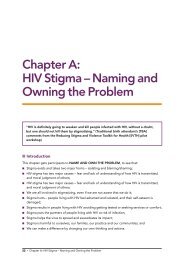Implementing Multiple Gender Strategies to Improve HIV and ... - ICRW
Implementing Multiple Gender Strategies to Improve HIV and ... - ICRW
Implementing Multiple Gender Strategies to Improve HIV and ... - ICRW
Create successful ePaper yourself
Turn your PDF publications into a flip-book with our unique Google optimized e-Paper software.
accompanied by djembe drumming. Once the music drew in a large<br />
enough audience (usually 50 people or more), the lead facilita<strong>to</strong>r signaled<br />
for the performers <strong>to</strong> begin. Other performances <strong>to</strong>ok place at schools or<br />
during community events <strong>and</strong> the audience came specifically <strong>to</strong> see the<br />
performance.<br />
The program also used the Forum Theater method, in which facilitated<br />
discussions take place during <strong>and</strong> throughout the performance. The women<br />
performed a play in which a character is oppressed in a situation that would<br />
be familiar <strong>to</strong> the audience. After playing it once, the ac<strong>to</strong>rs began the play<br />
again <strong>and</strong>, at any point during this second performance, any audience<br />
member could call out "s<strong>to</strong>p!" <strong>and</strong> take the place of the ac<strong>to</strong>r playing the<br />
oppressed character. The audience member then attempted <strong>to</strong> change the<br />
situation, while the performers playing the oppressors improvised <strong>to</strong><br />
attempt <strong>to</strong> bring the production <strong>to</strong> its original ending. If this audience<br />
member failed <strong>to</strong> change the situation, the performer resumed her role <strong>and</strong><br />
continued until another audience member called out "s<strong>to</strong>p!" <strong>and</strong> tried a<br />
different intervention. The audience members could also replace the<br />
oppressors, <strong>and</strong> find new ways of challenging the oppressed character. In<br />
this way, Forum Theater encouraged dialogue rather than a didactic<br />
depiction of a situation, enabling the participants <strong>to</strong> construct dramas <strong>and</strong><br />
plays based on their own experiences.<br />
The program also used a variety of arts-based exercises, including creative<br />
writing, pho<strong>to</strong>graphy, visual arts <strong>and</strong> movement, <strong>to</strong> help participants<br />
discuss the causes of violence against women in their community. The<br />
discussion around power relations in the home, for example, led <strong>to</strong> the<br />
investigation of women’s sexual agency. Most women had accepted that it<br />
is the man’s role <strong>to</strong> initiate sex, out of concern that men will be mistrustful or<br />
feel insecure if a woman initiates or suggests new methods in the bedroom.<br />
Participants saw the cultural process of assigning gender norms <strong>and</strong> roles<br />
<strong>to</strong> women <strong>and</strong> men as the main fac<strong>to</strong>r that exacerbates men’s notions of<br />
superiority. For example, during the amaXhosa ulwaluko initiation process<br />
for young men, boys are taught that men are heads of families <strong>and</strong> stronger<br />
than women. During the N<strong>to</strong>njane process for young women, girls are<br />
taught that a married woman must submit <strong>to</strong> the will of the man of the<br />
house. A married woman’s umakoti (duty) is <strong>to</strong> safeguard the problems of<br />
her home; she must place the family’s needs before her own <strong>and</strong> must not<br />
question her husb<strong>and</strong>’s authority.<br />
The project raised awareness through outreach performances conducted<br />
within schools, religious institutions <strong>and</strong> advocacy events. The goal was <strong>to</strong><br />
develop <strong>and</strong> document community-oriented strategies that could be<br />
implemented programmatically in partnership with local organizations.<br />
Project activities peaked during the annual 16 days of activism against<br />
gender-based violence, which is supported by community media <strong>and</strong><br />
challenges South Africans <strong>to</strong> declare an end <strong>to</strong> violence against women<br />
<strong>and</strong> children. The project’s women performers were invited <strong>to</strong> perform at<br />
events organized by various organizations <strong>and</strong> schools involved in the 2006<br />
16 Days of Activism campaigns.<br />
One of the functions of the performances was <strong>to</strong> address women’s legal<br />
protection by raising awareness around legal resources <strong>and</strong> recourses<br />
that are available <strong>to</strong> women. At the end of each performance, the lead<br />
facilita<strong>to</strong>r provided the names of various organizations the women could<br />
consult <strong>to</strong> learn about <strong>and</strong> access legal protection. The theater<br />
performances also helped participants increase their access <strong>to</strong> income, as<br />
128
















